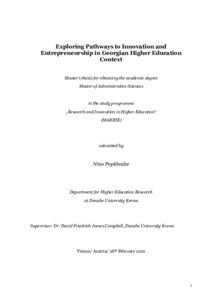Exploring Pathways To Innovation and Entrepreneurship in Georgian Higher Education Context
Popkhadze, Nino (2021)
Popkhadze, Nino
2021
Master's Programme in Research and Innovation in Higher Education
Johtamisen ja talouden tiedekunta - Faculty of Management and Business
This publication is copyrighted. You may download, display and print it for Your own personal use. Commercial use is prohibited.
Hyväksymispäivämäärä
2021-06-17
Julkaisun pysyvä osoite on
https://urn.fi/URN:NBN:fi:tuni-202103032372
https://urn.fi/URN:NBN:fi:tuni-202103032372
Tiivistelmä
The paradigm of innovation and entrepreneurship impacted universities and their transformation. Consequently, the roles, missions, and functions of the universities have changed over the years. This paper intends to unveil the current situation of Georgian higher education institutions and their pathways to become entrepreneurial and innovative. Besides, the paper explores the feasibility and possible application of the HEInnovate tool in the Georgian context.
The study favors qualitative research design. Interviews and extensive document analysis were conducted to portray the current picture of the Georgian HE context and respective challenges. The researcher deployed the scenario planning technique as a part of foresight methodology to create three possible futures based on the identified trends. Scenario planning paved the way for the recommendations and this method allowed the researcher to reflect creatively.
A broad spectrum of challenges has been identified through the document and interview analysis, the challenges have been clustered under the broad themes: Context, Funding, STI management, and Procedural framework. The results suggest that the idea of innovation and entrepreneurship looms large on the political agenda. Although the ecosystem is at a nascent stage, it lacks the build-up and cross-sectoral cooperation. The universities have a long way ahead to position as flagships for economic development. Nevertheless, strengthening the focus on applied research, both from donors and universities, could be a great starting point for societal engagement. The paper presents five respective recommendations which build on the scenario propositions and try to capitalize on the existing resources and complement already started processes for better optimization.
The study favors qualitative research design. Interviews and extensive document analysis were conducted to portray the current picture of the Georgian HE context and respective challenges. The researcher deployed the scenario planning technique as a part of foresight methodology to create three possible futures based on the identified trends. Scenario planning paved the way for the recommendations and this method allowed the researcher to reflect creatively.
A broad spectrum of challenges has been identified through the document and interview analysis, the challenges have been clustered under the broad themes: Context, Funding, STI management, and Procedural framework. The results suggest that the idea of innovation and entrepreneurship looms large on the political agenda. Although the ecosystem is at a nascent stage, it lacks the build-up and cross-sectoral cooperation. The universities have a long way ahead to position as flagships for economic development. Nevertheless, strengthening the focus on applied research, both from donors and universities, could be a great starting point for societal engagement. The paper presents five respective recommendations which build on the scenario propositions and try to capitalize on the existing resources and complement already started processes for better optimization.
